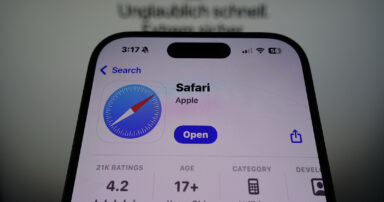Apple Explores AI Search Integration in Safari
Apple is reportedly considering a significant redesign of its Safari browser, focusing on integrating AI-powered search engines. This potential shift comes amid declining Safari usage and ongoing developments in Google's antitrust case.
Shifting Search Strategies
Eddy Cue, Apple's senior vice president of services, testified that Safari searches decreased for the first time last month. He attributes this decline to users increasingly opting for AI tools over traditional search engines. This shift coincides with the ongoing legal proceedings following Google's antitrust loss in August 2024.
“You may not need an iPhone 10 years from now as crazy as it sounds. The only way you truly have true competition is when you have technology shifts. Technology shifts create these opportunities. AI is a new technology shift, and it’s creating new opportunities for new entrants.”
The Rise of AI Search Providers
Cue believes AI search providers like OpenAI, Perplexity AI, and Anthropic could eventually replace traditional search engines like Google. He indicated Apple has already engaged in discussions with Perplexity and plans to integrate these AI options into Safari, though they likely won't be the default.
Apple currently offers ChatGPT through Siri and plans to add Google’s Gemini later this year. While acknowledging that AI search indexes need improvement, Cue believes their enhanced features will attract users.
Google's Antitrust Timeline
This development unfolds during a critical juncture in the Google antitrust case:
- August 2024: Judge Mehta ruled Google violated antitrust law with exclusive search deals.
- October 2024: The Department of Justice (DOJ) proposed remedies addressing search distribution, data usage, search results, and advertising.
- December 2024: Google offered counter-proposals to loosen search deals.
- March 2025: The DOJ filed revised proposals, including the potential sale of Chrome.
The $20 Billion Question
At the heart of the matter is Google's $20 billion annual agreement with Apple, making Google the default search engine in Safari. While anticipating changes to this deal, Cue expressed concern about the potential loss of revenue.
In 2022, Google paid Apple $20 billion for this default placement. Last year, the partnership expanded to include Google Lens in the Visual Intelligence feature on new iPhones.
Proposed Remedies and Google's Response
The DOJ's latest filing suggests significant changes, including:
- Requiring Google to sell Chrome.
- Restricting Google's payments for default search placement.
- Preventing Google from favoring its products in search results.
- Increasing transparency in Google's advertising practices.
Google has criticized these proposals, labeling them a "radical interventionist agenda." Instead, Google suggests allowing browser companies to work with multiple search engines and giving device makers more freedom over preloaded search options.
The Future of Search
Apple's potential shift towards AI search in Safari could significantly reshape the search landscape. This outcome could redefine search competition and digital marketing for years to come.








